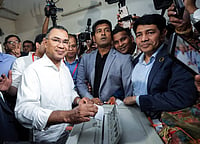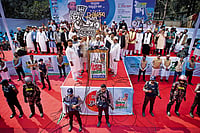A Muslim cleric is seen advising some young men to entrap Hindu and Christian women, and impregnate them if required, only to convert them to Islam and send them to West Asian countries to join the terrorist group Islamic State (ISIS). A young woman in police custody offers to tell the cops the history behind her entry into terrorism. A hijab-clad young woman is convincing a friend that wearing a hijab protects her from sexual assault.
Scene by scene, the trailer of filmmaker Sudipto Sen’s The Kerala Story unfolds India’s Hindu nationalists’ favourite conspiracy theory of ‘Love Jihad’. As per this theory, Muslim men entrap Hindu women as part of a religious war. The makers described the film as “heart-breaking and gut-wrenching stories of 32,000 females in Kerala!” which intends to “uncover the hidden truth, of the biggest invisible threat to our daughters”.
Last December, when Israeli filmmaker Nadav Lapid, who presided over the five-member jury of the 53rd edition of the International Film Festival of India (IFFI) at Goa, came under attack for calling the Vivek Agnihotri-directed film The Kashmir Files as “vulgar and propaganda” movie unworthy of a film festival entry, three other members of the jury board came out in his support. The only differing member of the jury was Indian filmmaker Sudipto Sen, whose latest film, The Kerala Story, has now emerged as the latest addition to the genre of recent films whose narratives align with the propaganda of India’s Hindu nationalists.
“Believe me, you've to listen to the stories of Shalini Geetanjai Nimah and Asifa. When I listened about them, my heart was numb. Only tears engulfed me. Promise — We'll debate and fight later. Please watch it for them and their helpless parents,” Sen wrote in a tweet.
Scheduled to be released on May 5, the film already has a controversial past as the Kerala Police had lodged an FIR last November, alleging that its teaser was spreading lies. In plain sight, the claim of 32,000 women —mostly Hindu and some Christian— converted to Islam under the pretext of marriage and were sent off to West Asia to fight for ISIS is a humongous exaggeration.
For, a 2021 US report said only 66 persons of Indian origin were on the list of ISIS foreign fighters. The Indian government, too, never estimated the number of Indian participants in the jihad of ISIS to be more than a few dozen. In fact, low Indian Muslim participation in the so-called global jihad —spearheaded first by Al Qaeda and later ISIS— has been a subject matter of academic and security-related discussion for a long time.
In 2020, Adil Rasheed, a research fellow at the New Delhi-based Manohar Parikkar Institute of Defence Studies and Analyses (MP-IDSA), wrote in an article titled ‘Why Fewer Indians Have Joined ISIS’ that the apparent apathy of the Indian Muslims towards “impassioned exhortations for global jihad” of ISIS is not a recent and isolated instance.
“It can also be viewed as the community’s continuing rejection of the so-called global jihad, since the time it rose to prominence in the Afghanistan-Pakistan (Af-Pak) region four decades ago,” he wrote, adding, “One of the reasons for the non-existent mujahideen from India could be that unlike some West Asian states then, India never had disposable radicals at home, nor would it ever pursue a policy of conveniently banishing them to foreign war theatres.”
The propaganda debate
The film’s claim, therefore, has faced strong opposition from the Left and the Congress, the ruling and the main Opposition force in Kerala, respectively. On Sunday, a day after Kerala Congress demanded that the Left Front government prohibits the screening of the film in the state, Chief Minister Pinarayi Vijayan lashed out at the film, calling it a “product of Sangh Parivars’s lie-factory”.
“Freedom of expression is not a license to communalise this country, spread lies, and divide the people. Legal action will be taken against all such anti-social activities,” said Vijayan.
Leaders and supporters of the BJP and other Hindu nationalist organisations have come out strongly in support of the film, just as they did the same at the time of controversy surrounding ‘The Kashmir Files’.
The BJP’s national IT cell chief Amit Malviya described the film as “based on real-life stories” which were “shocking and disturbing.”
“The movie portrays the rapid Islamisation of Kerala and how innocent girls are being trapped and groomed to be used as cannon fodder for ISIS. Love Jihad is real and dangerous,” he tweeted.
“Why are the self-proclaimed champions of ‘freedom of expression’ demanding a ban on the film ‘The Kerala Story’?” asked the BJP’s Kerala state unit president K Surendran, alleging that the Left and Congress are trying to downplay Love Jihad. “It's a reality. Thousands of innocent girls belonging to the Christian and Hindu religions are victims of this.”
There were others who contested this argument, saying the two were not comparable, as one is a documentary, while the other one is fiction sold as a real-life story.
Whether The Kerala Story or its makers face any action from the state government, or non-BJP governments in other states, remains to be seen. But the time of the release of the trailer and the film could not be overlooked, as it comes days before the assembly election in BJP-ruled Karnataka, a Kerala-bordering state where ‘love jihad’ —the central theme of The Kerala Story— has been propagated by the BJP and other Hindutva forces for over a decade.
The release of such films often has a connection with elections. In 2019, the Tashkent Files, which tries to sell the Hindu nationalist conspiracy theory blaming Congress for former Prime Minister Lal Bahadur Shastri’s death in Tashkent, was released in April, amidst the Lok Sabha election campaign. The Vivek Oberoi-starrer biopic of Prime Minister Narendra Modi was also scheduled to release during the height of the campaign but the Election Commission of India (ECI) postponed its release.
The run-up to the 2024 Lok Sabha election is going to see a trilingual biopic of Rashtriya Swayamsevak Sangh (RSS)-founder Keshav Baliram Hedgewar in Hindi, Marathi, and English and a biopic of BJP icon Deen Dayal Upadhyay.
Hindutva films: List gets longer
According to film critic Tanul Thakur, propaganda films are emerging as a new trend because they are getting endorsements from the “top of the government”. These “cheap, hate-ridden propaganda films” have become a very convenient tool to win the favour of the people at the helm of government affairs, he says.
“Don’t forget ‘The Kashmir Files’ got a direct endorsement from the Prime Minister inside the Parliament and that endorsement helped improve the film’s box office scenario. While critics rubbished Agnihotri’s previous film, The Tashkent Files, as political propaganda, it went on to win national awards,” says Thakur.
In 2021, in an article in The Washington Post, journalist Rana Ayub described the Akshay Kumar-starrer Sooryavanshi as “dangerous” for its “criminal and brazen Islamophobia”.
“After watching it, it’s impossible not to think of Nazi Germany, where Hitler cultivated a film industry that paid obeisance to him and made propaganda films against Jews,” she wrote.
Last year, apart from The Kashmir Files, there were the anti-caste-based-reservation film Hurdang and the Karan Razdan-directed Hindutva Chapter One: Main Hindu Hoon. Razdan told the media before the release of the film that he intended to “set the record straight” about the “wrong perception” that so-called secularists are spreading about Hindutva globally. In writer-director Abhishek Sharma’s Ram Setu which stars Akshay Kumar, the protagonist describes Delhi’s Qutub Minar as a symbol of India’s defeat.
The trend has also gone beyond Bollywood, as is evident from the current Maharashtra Chief Minister Eknath Shinde-backed Marathi biopic of late Shiv Sena leader Anand Dighe, named Dharmaveer: Mukkam Post Thane, which was released last year. Shinde is featured prominently in the film as one of Dighe’s trusted aides.
Besides, the first-look poster of the upcoming film Hum Do Hamare Baarah also triggered apprehensions that it would be another Islamophobic movie linking Muslims with India’s high population growth rate, as the poster showed a Muslim man with his pregnant wife and 11 children.
“This is a textbook definition of propaganda, typically associated with the political party in power,” says film critic Sohini Chattopadhyay.
She points out that cinema was born as a technology in the 20th century, which also happened to be the age of nationalism, and has been a particularly potent means of propaganda.
Chattopadhyay mentions as examples Sergei Eisenstein’s Battleship Potemkin in Soviet Russia, Leni Riefenstahl’s Triumph of the Will during the Third Reich, and American director D W Griffith’s Birth of the Nation, besides the espionage films during the Cold War years when Hollywood put forth America as the free world. Pre-Independence India saw the trend of films about the awakening of people against tyrants, the Fearless Nadia-starred films for example, while some Raj Kapoor and Dilip Kumar films propagated Nehruvian Socialism, she says.
“Now, the political Right is doing the same thing in Bombay cinema. The question is, does it hold up as art or entertainment? Unlike Eisenstein and even Riefenstahl and some pompous Hollywood films, no and no! They may make money but everything that makes money is not entertainment. It is the pleasure of having your delusions reinforced,” says Chattopadhyay.


























